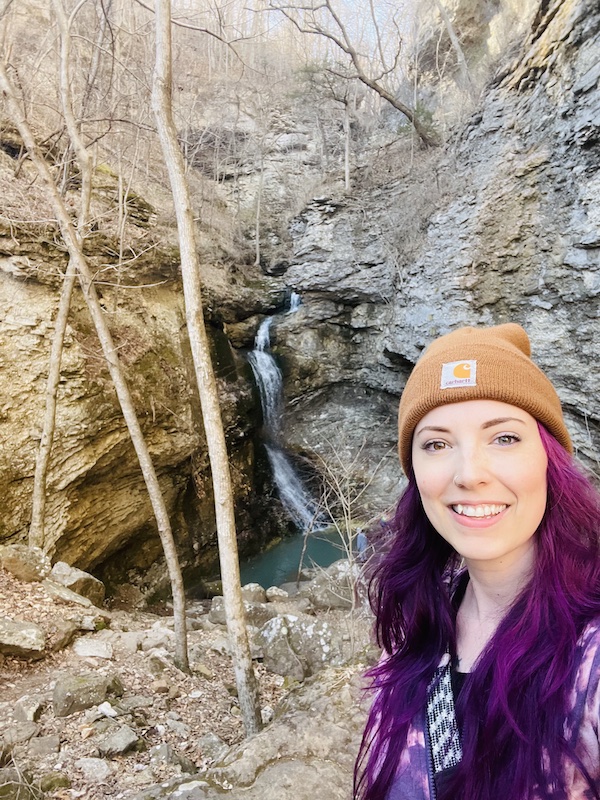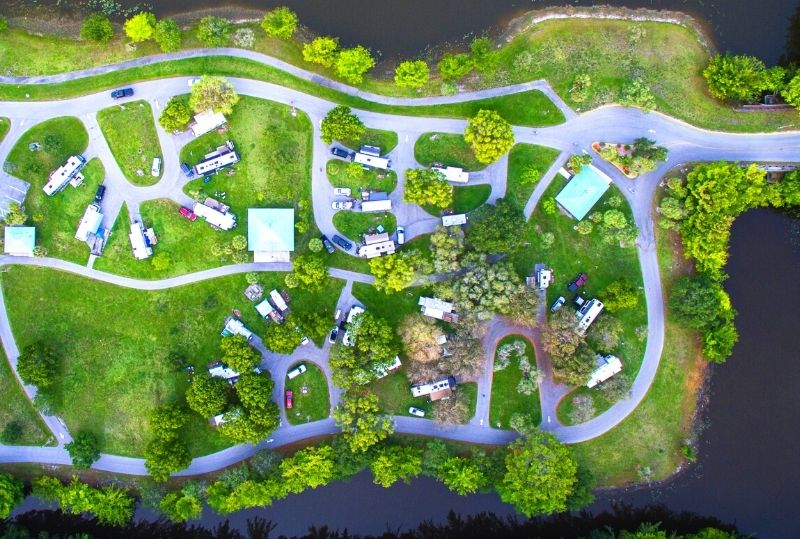Thanks for your support! If you make a purchase using our links in this article, we may make a commission. And, as an Amazon Associate, I earn from qualifying purchases. See the full disclosure here.
Do you want to buy an RV campsite? With the surge in RVing popularity and increasing difficulty in booking campsites, it might be a good idea.
2021 was a record-breaking year for RV sales. In fact, the RVIA reported a whopping 600,240 RV sales for the year. However, only around 60,000 new campsites opened up in the same year. That’s a huge discrepancy.
Some RVers are taking matters into their own hands by buying their own RV campsites. When you own your campsite, you never have to worry about finding reservations again.
In this article, we’re covering the pros, cons, and considerations of buying your own RV campsite.
What Do I Need to Consider Before Buying an RV Real Estate Lot?
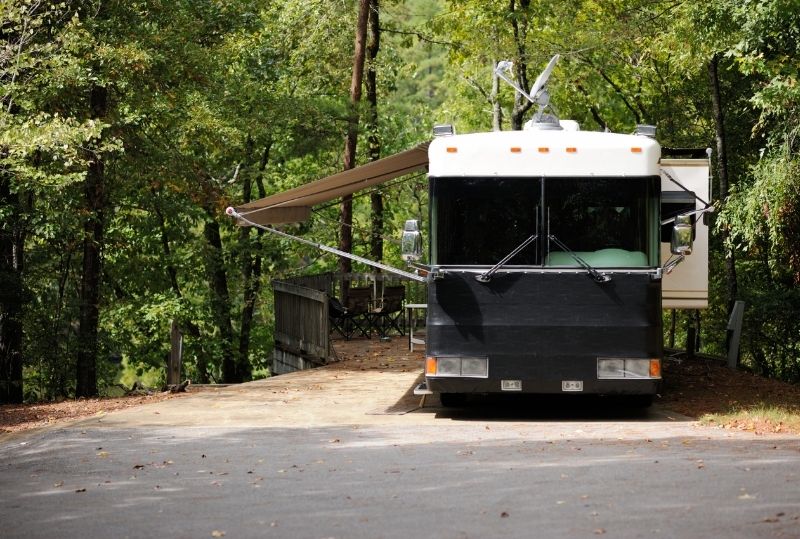
Depending on your personal style of travel and RVing, buying an RV lot might be a great idea.
The idea of buying your own campsite has been around for decades. However, the consideration is becoming more popular these days as a result of the scarcity of campground reservations.
While it used to just seem like a thing snowbirds did to escape the cold northern weather in the wintertime, it’s not anymore.
People of all ages and from all walks of life are turning to campsite ownership for many reasons. Some view campsite ownership as an investment opportunity. Others, a retirement plan. And, for others, owning their own campsite is the answer to the growing problem of campsite scarcity.
However, as amazing as it might sound, there are a lot of considerations to make before you pull the trigger.
Things like HOA fees, resort/campground rules, how much control you have over your space, pet breed restrictions, and more are all important factors that can make or break your decision.
RVBlogger Pro tip: The March 2022 issue of RV Camping Magazine features Izzy and MJ of Endless RVing’s motivation and purchasing experience of their own campsite. To read this issue and get all new issues sent straight to your email, sign up for free here!
4 HOA, Additional Fees, and Financial Considerations
The price of your lot isn’t the only thing you’ll pay for when you buy a deeded RV lot. Depending on the campground, city, or resort, you’ll also have to consider other fees.
1. HOA Fees, Resort Fees, or Country Club Fees
Homeowner Association (HOA) fees can vary from less than $100 per month all the way up to $500. These fees go towards maintaining the resort for things like maintenance, landscaping, janitorial, and more.
The more upscale the resort, the higher the fees will be. When considering a campground or resort, always find out how much the HOA fees are and when they are due. In addition, find out what all your HOA fees cover.
Mowing and landscaping are major conveniences. However, you might save money if you find a lot where you are expected to upkeep your own lawn and landscaping.
2. Taxes
When you purchase an RV real estate lot, expect to pay local real estate and property taxes. Taxes vary based on location, so brush up on the tax rates and types before making your purchase decision.
3. Utilities
If you want to buy an RV campsite, be sure you find out what utilities are your responsibility. Some utilities may be included in your HOA or resort fees. In fact, sometimes all are included. But, at other campgrounds or resorts, you may be responsible for all the utilities yourself.
Utilities to consider include water, sewer, electricity, cable, and internet.
4. The Ultimate Question: Is It a Wise Financial Choice for You?
There’s no doubt about it: buying your own RV campsite is a major investment. And the overall cost to you, both up-front and over the course of time, is never as simple as the price of the lot itself.
You will have initial fees for the purchase of the property, optional improvement fees for any changes or additions, and recurring fees we just discussed.
Some of the costs of RV lot ownership can be offset by renting your space out part-time, but this is a consideration only you can make. And, not every resort or campground will allow you to rent out your lot, so factor that into your decision as well.
Your Return on Investment and Decision Power

If you want to buy an RV campsite and rent it out, first find out if it’s allowed at your preferred location. If you’re buying the RV campsite as an investment, be sure to find out your ROI potential before moving forward.
Don’t think just because it’s in a “hot” location, it will do well. In fact, some resorts might not even let you rent your spot out at all. Additionally, find out how much control you actually have over “your” property.
Resort and HOA rules and regulations vary by each property. Find out what you can and can’t do with your property, including:
- Whether or not you can rent it out.
- What kind of improvements or alterations you can make.
- Additionally, find out if there are occupancy length restrictions for owners.
Considerations for Renting Your Deeded RV Property
If renting your RV campsite out is of particular interest to you, it’s important to know that the process will vary depending on the location. In Izzy and MJ’s situation, their resort handles the entire renting process for them. However, that’s not always the case.
Another factor to consider if you are buying with the plan to rent your lot out is the type of lot you purchase.
If renting is the goal (or a large part of the goal), look for a lot that will be most attractive to renters. More attractive RV lots will be more sought-after by renters. And, as a result, they will fetch a higher rental price.
A mid-row or RV neighbor-locked campsite won’t be as attractive to renters as:
- Lots with a lot of extra space.
- Privacy features like custom hedging or privacy landscaping.
- Additional structures like a casita/gazebo, permanent outdoor kitchen, dock into the water, a pool, etc.
- Water-front RV lot property.
- A lot next to a nature preserve that gives natural privacy.
Location, Location, Location
The location should always play a big role in your decision-making. It’s more than simply considering the general location or locality. Once you find RV lots for sale in your desired locality, go check them out. While touring the facility, make note of things like:
- Highway, road, train, or airport noise.
- Surrounding neighborhoods.
- Proximity to things like shopping, restaurants, doctors, or natural attractions.
- Year-round weather patterns and temperatures.
Finally, consider the local real estate market. Is it in an up-and-coming location? Purchasing in an up-and-coming real estate market is a wise financial choice for ROI if you decide to sell.
Location may also play a major role in your purchase decision if you want to buy an RV lot in a region where it can seem impossible to get a reservation, like South Florida in the winter.
Campground or Resort Amenities
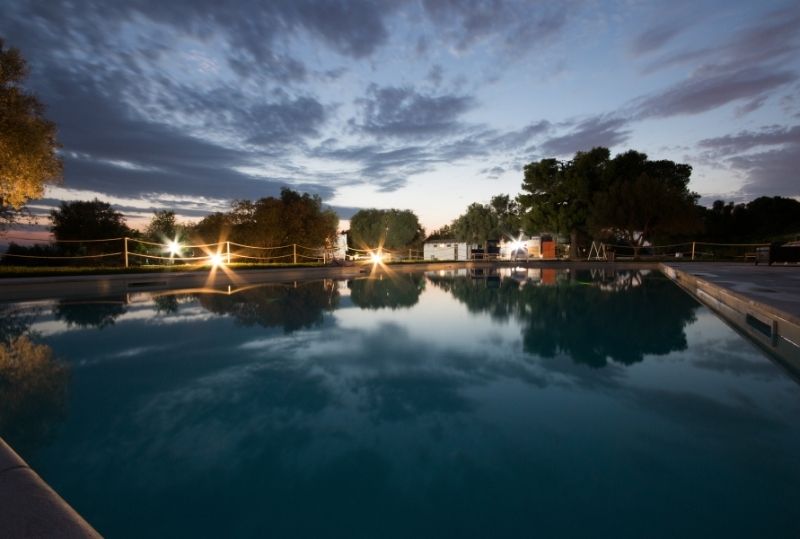
Another factor to consider when buying your own RV campsite is the on-site features and amenities.
Find out what the campground or resort has to offer. Things like pools, clubhouses, hot tubs, laundry room, and an on-site mailroom are all major benefits. If structured activities and gatherings are important to you, find out what the resort has to offer.
Connecting With the RV Community
Some campgrounds and resorts have certain rules and restrictions that may make the location more or less attractive to you.
Before even considering a location, find out if they have rules like:
- The RV 10 year rule – where your RV has to be 10 years old or less.
- Class A Motorhome-only locations.
- Breed-specific litigation where they don’t allow certain dog breeds.
- Age specifications, such as a 55 and up resort.
Will any of these factors make or break owning a lot in the resort for you?
In a recent YouTube video by Endless RVing, Izzy and MJ seemingly found a perfect RV resort. After touring and falling in love with everything about it – they ran into a major problem: dog breed restrictions.
In the video, they explain that even if they didn’t have their beloved pit bulls, they would never choose a resort that had any kind of breed restrictions.
Hopefully, by reading this article and preparing yourself to ask questions early-on, you can avoid the disappointment of falling in love with a location only to find out you don’t qualify to buy it.
Adding Structures and Features
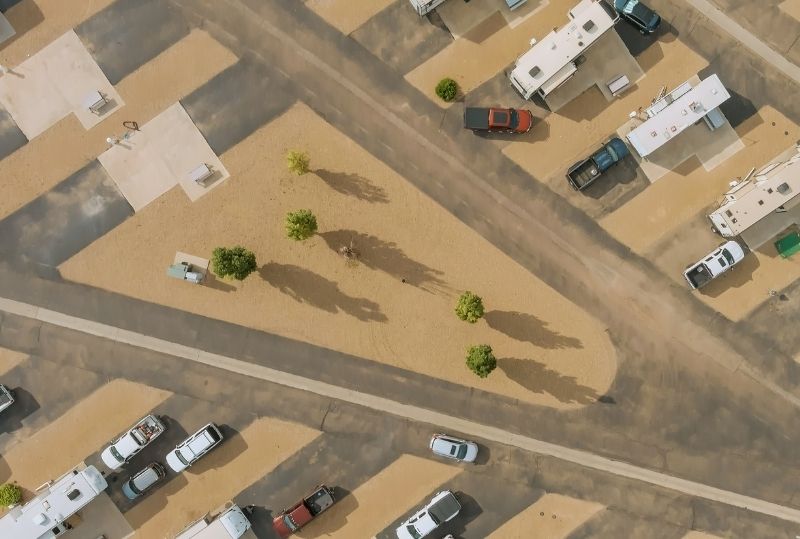
Whether you’re buying a pre-owned campsite or a brand new deeded RV lot, find out whether or not you’re allowed to alter your property.
Many RVers want to add things like their own landscaping, a casita/gazebo, and other personalization or privacy features. Some RV resorts even allow you to add your very own pool as long as it fits within their specified development rules.
Will you want to add improvements, buildings, or additional features like privacy landscaping?
Always find out what is and isn’t allowed with the resort before you consider a purchase decision. Buying an RV lot at a resort that doesn’t allow you to add your own touches might not feel like it’s really “yours”.
What About The Kids?
This is an important one: what happens to the RV lot when you’re gone?
If you buy an RV lot as a lifetime RV home base, do you get to give it to your heirs when you’re gone?
While most RV resorts and campgrounds let you pass down your property to your heirs, others do not.
If you buy a lot from an Escapees Co-Op, you cannot leave it to your loved ones or sell it to anyone. Your only option is to sell it back to the Co-Op. Their goal is to give others an opportunity to join, rather than turn the campground into a closed community of the same families.
If you plan to buy an RV campsite as an investment to sell at a higher price later, be sure to find out if that’s allowed. Additionally, if you want your deeded lot to stay in the family even after you’re gone, be sure the resort or campground allows it.
Another very important consideration when purchasing an RV campsite is whether or not you’re allowed to sell it at a later date.
Many resorts and campgrounds will allow you to sell your lot yourself. However, others (Like Escapees Co-Op Parks) may only allow you to sell it back to the resort for the original purchase price.
Can You Sell?
No one knows what the future holds. But if you even think you might want to sell your campsite at a later date, be sure to find out the resort rules about selling.
In fact, purchasing a campsite in a hot location can be an extremely wise investment opportunity. Buying early in an up-and-coming location can allow you to sell for a big profit later; as long as it’s allowed, of course.
Overall Pros and Cons of Buying an RV Campsite
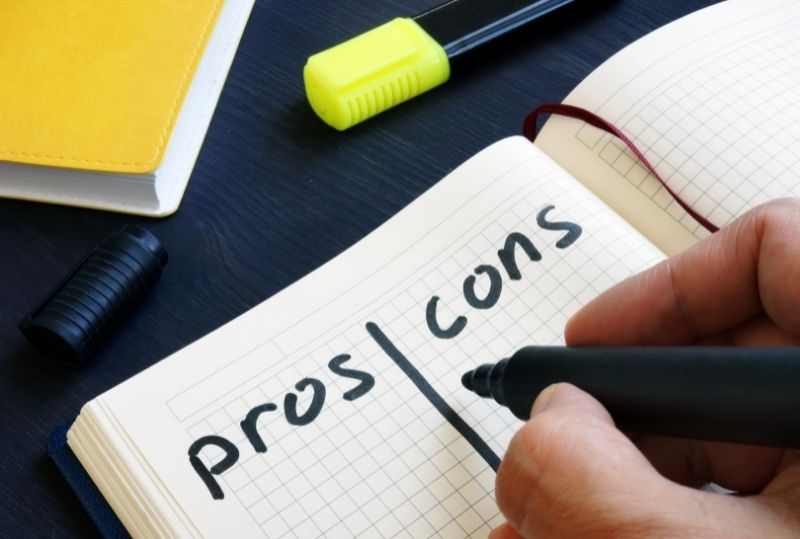
Now that you know the most important considerations of buying an RV campsite, here are the pros and cons.
Pros
- Buying an RV lot can be a great investment, especially in up-and-coming real estate markets.
- If you live in your RV full time, and like to camp in one region, you can save money on overnight camping.
- In most cases, owning your property allows you to add your own personalizations. This includes buildings, landscaping, and sometimes more.
- Some locations have great amenities and take care of everything for you including utilities, maintenance, mowing, and landscaping.
- You never have to worry about making campsite reservations again. When you want to camp, you can camp. When you want to leave, you can leave. This eliminates the stress of RV campsite hunting in an increasingly popular lifestyle.
Cons
- Additional fees like HOA, resort fees, etc.
- Depending on the location and market, RV lots can be incredibly expensive.
- Some resorts have restrictions like RV type, RV age, pet breed, and more.
- Additionally, some resorts have restrictions about what you can and can’t do with your RV lot.
- If you don’t plan to camp exclusively in one location, owning an RV lot might not be right for you. Unless, of course, your primary plan for the lot is to use it as a rental property.
Conclusion
Is buying your own RV lot right for you?
This is something only you can answer for yourself, and it’s not a small decision to make. If you’re considering buying your own campsite, be sure to shop around. Compare prices, compare amenities, and compare rules and regulations.
Additionally, don’t be afraid to ask questions. It’s better to be informed than to get hit with a bunch of unsavory revelations during or after the purchase process.
Talking with a real estate and financial expert can help you buy the RV campsite of your dreams and how to make it financially feasible for you.
And if you’ve read this far, you’re on the right track.
Related Reading:
Why Are RV Park Rates So High?
6 Best Campsite Availability Checker Apps
10 Reasons to Avoid RV Campgrounds
4 Best Portable Inflatable Hot Tubs For RVers
10 Cheap Snowbird RV Destinations in the Sunbelt
About the Author
Carrie Wilder is a part-time van lifer, full-time nomadic lifestyle enthusiast, and the advertising and SEO Manager at Escapees RV Club.
When she’s not camping or working, you can find her writing about her favorite marketing tips on her website, The World Wild Web, or befriending the nearest cat.
